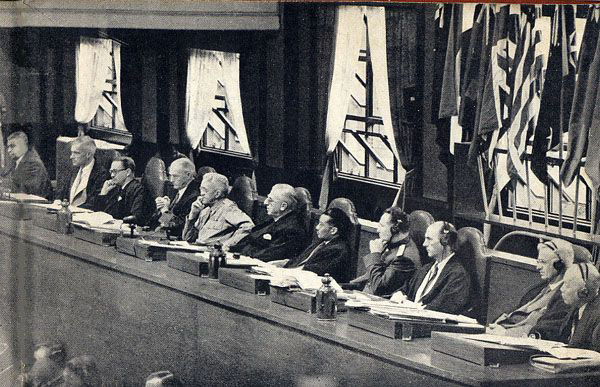(image source: Wikimedia Commons)
The "Internationales Wissenschaftsforum Heidelberg" and Heidelberg University (JRG: "Transcultural Justice: Legal Flows and the Emergence of International Justice within the East Asian War Crimes Trials, 1945-1954"/Excellenzcluster "Asia aand Europa in a Global Context") organize a conference on the "Transnational Histories of the Tokyo Trials".
Registration is open until 5 December 2015.
Summary:
The lineages of contemporary international law have generally been envisioned in terms of the imposition of western concepts on other parts of the world. As research has shown, war crimes trials after the Second World War, in particular the International Military Tribunals at Nuremberg (IMT) and at Tokyo (IMTFE), claimed to be enforcing “justice”, but nevertheless proved to be battlegrounds for intense political and ideological struggle within the new post-war international world order. War crimes trials thus contributed to the development of international criminal law, the formation of transcultural norms of legality and legitimacy, as well as transnationally debated (and contested) notions of “justice.”Program:
This workshop brings together fresh research on the political contexts in which new norms and practices of international criminal law emerged after 1945 in Asia, studying how the Tokyo Tribunal, active between May 1948 and November 1948, operated under the impact of external political and legal pressures, while also evolving new standards and debates that left a global impact beyond Japan. Through a combination of qualitative comparative research, theoretical conceptualization, and policy and cultural analyses, this project - by using the biographical lens on individual actors and interest groups - scrutinizes new modes and techniques of political legitimation and juridicality which emerged in the mid-20th century as a result of transcultural encounters in the crossroads of Europe, USA, USSR, Australia, and East, South-East and South Asia.
While the workshop gives due importance to legal actors who contributed to the formation of the majority judgment, it also puts in the foreground judges who did not throw their lot in with the majority judgment, and emphasizes subversive blocs or coalitions of individuals, thereby including also the defense lawyers in the trial. These various actors produced subterranean transnational networks that sometimes remain invisible in research. This workshop focusses also on the networks constructed through juridical institutions and theatres (not only the trial itself, but also universities, the UNWCC, the International Law Commission) which either had an impact on the trial or were influenced by its legacies.
Sunday, 6 Dec 2015:Contact:
Opening of the conference:
18.00-18.20:
Kerstin von LINGEN (Heidelberg U): Introduction: Legal Flows and Travelling Judges at the IMTFE.
Dinner
19.45 Film Screening (Japan. documentary 'Inside the Tokyo Tribunal', English version, aprox. 60 mins)
Monday, 7 Dec 2015:
10.00 h-10.25: Morning Coffee
10.25-10.55
Urs Matthias ZACHMANN (Edinburgh U): Loser’s Justice: the Tokyo Trial from the Perspective of the Japanese Legal Community
10.55-11.25
James Burnham SEDGWICK (Acadia University, Nova Scotia/ Canada): Building Blocs: Communities of Dissent, Manufactured Majorities, and International Judgment in Tokyo
11.25-11.55
Yuki TAKATORI (Georgia State University, Atlanta): “Justifying the vengeance by a successful belligerent” – Canadian view of the Tokyo War Crimes Trial
11.55 – 12.25
Hitoshi NAGAI (Hiroshima City University): Burdened by the “Shadow of War”: Justice Delfin Jaranilla and the Tokyo Trial
GROUP PICTURE
Lunch Break 12.30-14.30
14.30-15.00
Anja BIHLER (Heidelberg U): Judge Mei Ru’ao and the Chinese delegation at the IMTFE Criminals
15.00-15.30
Valentyna POLUNINA (Heidelberg U): The Soviets at Tokyo: international justice at the dawn of the Cold War
15.30-16.00
Ann-Sophie SCHOEPFEL (Heidelberg U): Defending French National Interests or Defending Justice Bernard? The dilemma of Ambassador Zinovy Peshkoff at the Tokyo Trial
16.00–16.20 Afternoon Coffee
16.20-16.50
Lisette SCHOUTEN (Heidelberg U): In the footsteps of Grotius. The Netherlands and its representation at the International Military Tribunal for the Far East, 1945-1948.
16.50-17.20
Kerstin VON LINGEN (Heidelberg U): Judge William Patrick, Prosecutor Arthur Comyns-Carr and British approaches to the IMTFE
17.20-17.50
David M. CROWE (Elon U, USA): MacArthur, Keenan, and the American Quest for Justice at the IMFTE
Concluding Debate
End of conference 18.30
Kerstin von Lingen
Exzellenzcluster, Vossstr. 2/4400, 69115 Heidelberg
06221/544377
lingen@asia-europe.uni-heidelberg.de
Source: HSozKult.



